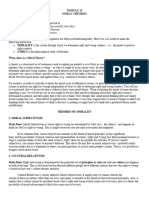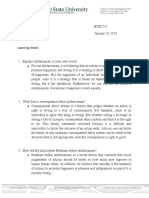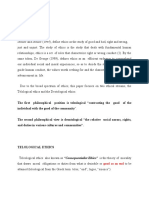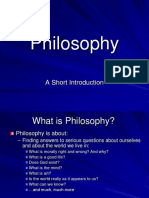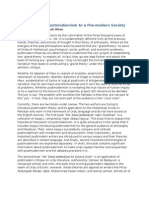0 ratings0% found this document useful (0 votes)
27 viewsPERF 01c
PERF 01c
Uploaded by
Leonisa TorinoThis document discusses five sources or bases for determining whether something is right or wrong:
1. Moral subjectivism - right and wrong is determined by an individual's own thoughts and feelings, but this denies the possibility of moral criticism or principles.
2. Cultural relativism - right and wrong is determined by a culture's principles, but this denies the possibility of universal moral principles or of a culture being mistaken.
3. Ethical egoism - right and wrong is determined by one's self-interest, but this implies immorality in helping others at one's own expense.
4. Utilitarianism - right and wrong is determined by the overall consequences and goodness/happiness
Copyright:
© All Rights Reserved
Available Formats
Download as DOCX, PDF, TXT or read online from Scribd
PERF 01c
PERF 01c
Uploaded by
Leonisa Torino0 ratings0% found this document useful (0 votes)
27 views1 pageThis document discusses five sources or bases for determining whether something is right or wrong:
1. Moral subjectivism - right and wrong is determined by an individual's own thoughts and feelings, but this denies the possibility of moral criticism or principles.
2. Cultural relativism - right and wrong is determined by a culture's principles, but this denies the possibility of universal moral principles or of a culture being mistaken.
3. Ethical egoism - right and wrong is determined by one's self-interest, but this implies immorality in helping others at one's own expense.
4. Utilitarianism - right and wrong is determined by the overall consequences and goodness/happiness
Copyright
© © All Rights Reserved
Available Formats
DOCX, PDF, TXT or read online from Scribd
Share this document
Did you find this document useful?
Is this content inappropriate?
This document discusses five sources or bases for determining whether something is right or wrong:
1. Moral subjectivism - right and wrong is determined by an individual's own thoughts and feelings, but this denies the possibility of moral criticism or principles.
2. Cultural relativism - right and wrong is determined by a culture's principles, but this denies the possibility of universal moral principles or of a culture being mistaken.
3. Ethical egoism - right and wrong is determined by one's self-interest, but this implies immorality in helping others at one's own expense.
4. Utilitarianism - right and wrong is determined by the overall consequences and goodness/happiness
Copyright:
© All Rights Reserved
Available Formats
Download as DOCX, PDF, TXT or read online from Scribd
Download as docx, pdf, or txt
0 ratings0% found this document useful (0 votes)
27 views1 pagePERF 01c
PERF 01c
Uploaded by
Leonisa TorinoThis document discusses five sources or bases for determining whether something is right or wrong:
1. Moral subjectivism - right and wrong is determined by an individual's own thoughts and feelings, but this denies the possibility of moral criticism or principles.
2. Cultural relativism - right and wrong is determined by a culture's principles, but this denies the possibility of universal moral principles or of a culture being mistaken.
3. Ethical egoism - right and wrong is determined by one's self-interest, but this implies immorality in helping others at one's own expense.
4. Utilitarianism - right and wrong is determined by the overall consequences and goodness/happiness
Copyright:
© All Rights Reserved
Available Formats
Download as DOCX, PDF, TXT or read online from Scribd
Download as docx, pdf, or txt
You are on page 1of 1
LEONISA GUERRERO TORINO BSA 2
From the notes on the foundation of ethics, it is said that there is a difference between right and wrong. Give at least
your 5 sources or bases when do you say something is wrong or right. Reflect on each base or source you mentioned. 5
sentences only per bases.
(1) Moral Subjectivism
Right and wrong is determined by what you -- the subject -- just happens to think (or 'feel') is right or wrong.
In its common form, Moral Subjectivism amounts to the denial of moral principles of any significant kind,
and the possibility of moral criticism and argumentation. In essence, 'right' and 'wrong' lose their meaning
because so long as someone thinks or feels that some action is 'right', there are no grounds for criticism. If
you are a moral subjectivist, you cannot object to anyone's behavior (assuming people are in fact acting in
accordance with what they think or feel is right). This shows the key flaw in moral subjectivism -- probably
nearly everyone thinks that it is legitimate to object, on moral grounds, to at least some peoples' actions.
(2) Cultural Relativism
Right and wrong is determined by the particular set of principles or rules the relevant culture just
happens to hold at the time.
Cultural Relativism is closely linked to Moral Subjectivism. It implies that we cannot criticize the actions of
those in cultures other than our own. And again, it amounts to the denial of universal moral principles. Also, it
implies that a culture cannot be mistaken about what is right and wrong (which seems not to be true), and so it
denies the possibility of moral advancement (which also seems not to be true).
(3) Ethical Egoism
Right and wrong is determined by what is in your self-interest. Or, it is immoral to act contrary to your
self-interest.
Ethical Egoism is usually based upon Psychological Egoism -- that we, by nature, act selfishly. Ethical
egoism does not imply hedonism or that we ought to aim for at least some 'higher' goods (e.g., wisdom,
political success), but rather that we will (ideally) act so as to maximize our self-interest. An ethical egoist will
claim that the altruist helps others only because they want to (perhaps because they derive pleasure out of
helping others) or because they think there will be some personal advantage in doing so. This leads us to the
key implausibility of Ethical Egoism -- that the person who helps others at the expense of their self-interest is
actually acting immorally.
(4) Utilitarianism
Right and wrong is determined by the overall goodness (utility) of the consequences of action.
Utilitarianism is a Consequentialist moral theory.
The Greatest Happiness Principle (GHP) implies that we ought to act so as to maximize human
welfare. We do this in a particular instance by choosing the action that maximizes pleasure/happiness and
minimizing suffering. In general, morally right actions are those that produce the best overall consequences /
total amount of pleasure or absence of pain.
(5) Kantianism (Immanuel Kant’s Theory)
The rightness or wrongness of actions does not depend on their consequences but on whether they
fulfill our duty. According to Kant, a good person is someone who always does their duty because it is their
duty. It is fine if they enjoy doing it, but it must be the case that they would do it even if they did not enjoy it.
The overall theme is that to be a good person you must be good for goodness sake. Never treat anyone
merely as a means to an end. Rather, treat everyone as an end in themselves.
You might also like
- Metaethics, Normative Ethics, and Applied EthicsDocument6 pagesMetaethics, Normative Ethics, and Applied EthicsTyler Lee100% (2)
- Human Kindness and the Smell of Warm Croissants: An Introduction to EthicsFrom EverandHuman Kindness and the Smell of Warm Croissants: An Introduction to EthicsNo ratings yet
- The Big Three of Greek Philosophy: Socrates, Plato, and AristotleDocument3 pagesThe Big Three of Greek Philosophy: Socrates, Plato, and AristotleSEM 0112No ratings yet
- Report April 27 Moral TheoriesDocument4 pagesReport April 27 Moral TheoriesJoan Suzette CaringalNo ratings yet
- Civics Chapter 2Document80 pagesCivics Chapter 2samuel.ugr-0421-16No ratings yet
- Course OutlineDocument62 pagesCourse OutlinemasorNo ratings yet
- Moral TheoriesDocument20 pagesMoral Theoriessheila roxasNo ratings yet
- Chapter Two: Approaches To EthicsDocument12 pagesChapter Two: Approaches To Ethicsnat gatNo ratings yet
- Lesson 14 Moral Theories1Document13 pagesLesson 14 Moral Theories1ashtonNo ratings yet
- Moral and Citizenship Education 2Document47 pagesMoral and Citizenship Education 2sintebetaNo ratings yet
- The Nature of Morality and Moral TheoriesDocument16 pagesThe Nature of Morality and Moral TheoriesPax GarciaNo ratings yet
- Chapter 3Document56 pagesChapter 3Mahah Mamasalagat GudalNo ratings yet
- Ilp in EthicsDocument8 pagesIlp in EthicsMaria Ana AmoloNo ratings yet
- Moral TheoriesDocument5 pagesMoral TheoriesRevy CumahigNo ratings yet
- Module 10Document3 pagesModule 10Mary Nel ZabalaNo ratings yet
- Unit Two1Document91 pagesUnit Two1samuel abrehamNo ratings yet
- Normative Framework of EthicsDocument25 pagesNormative Framework of EthicsAnuradha GaikwadNo ratings yet
- Moral Theories As Frames of Moral Experiences: Issaiah Nicolle L. Cecilia 1 NRS - 1Document4 pagesMoral Theories As Frames of Moral Experiences: Issaiah Nicolle L. Cecilia 1 NRS - 1Issaiah Nicolle CeciliaNo ratings yet
- Ch1 Ethics and Ethical ReasoningDocument4 pagesCh1 Ethics and Ethical ReasoningdalenonatoNo ratings yet
- Ethics: GRE ENDocument26 pagesEthics: GRE ENVionna BeaNo ratings yet
- Senses of The SelfDocument2 pagesSenses of The SelfJexter SerquinaNo ratings yet
- Chapter TwoDocument99 pagesChapter TwoHabtamu AdimasuNo ratings yet
- Unit I. Theories and Principles of Health EthicsDocument6 pagesUnit I. Theories and Principles of Health EthicsShane PangilinanNo ratings yet
- Module14 - Moral TheoriesDocument7 pagesModule14 - Moral TheoriesJOMARI BAUTISTANo ratings yet
- MODULE 5: Ethical Framework: Utilitarianism/ConsequentialismDocument8 pagesMODULE 5: Ethical Framework: Utilitarianism/ConsequentialismArjim TagnipisNo ratings yet
- 8 Soc Sci 101N Module 5 Lesson 1 - Moral TheoriesDocument5 pages8 Soc Sci 101N Module 5 Lesson 1 - Moral TheoriesWymar Joshua EdiongNo ratings yet
- Guided QuestionsDocument13 pagesGuided QuestionsJeff LebronNo ratings yet
- Ethics Narrative ReportDocument10 pagesEthics Narrative ReportJesena SalveNo ratings yet
- Ethical Theories, Et Al.Document9 pagesEthical Theories, Et Al.SurayyaNo ratings yet
- CivecDocument59 pagesCivecSamuel AdamuNo ratings yet
- John Stuart Mill - Lec 9 HW PhilDocument5 pagesJohn Stuart Mill - Lec 9 HW PhilalyssaNo ratings yet
- Learning Check UtilitarianismDocument3 pagesLearning Check UtilitarianismRose Ann CalderonNo ratings yet
- Week 7 PhilDocument9 pagesWeek 7 PhilJoel Cheung Yi LinNo ratings yet
- Chapter Two NotesDocument8 pagesChapter Two NotesHanan FuadNo ratings yet
- Ethics (Or Moral Philosophy)Document49 pagesEthics (Or Moral Philosophy)Jewel CabigonNo ratings yet
- Theories EthicsDocument9 pagesTheories EthicsvivekNo ratings yet
- Introduction To Philosophy Unit 5Document46 pagesIntroduction To Philosophy Unit 5Muta ChilesheNo ratings yet
- Chapter 4Document20 pagesChapter 4Alyssa Grace CamposNo ratings yet
- Ethical Theories ComparedDocument24 pagesEthical Theories ComparedsabihuddinNo ratings yet
- Ethical Egoism Guided Study Pro and ConDocument5 pagesEthical Egoism Guided Study Pro and ConKjguezilleNo ratings yet
- Chapter TwoDocument46 pagesChapter Twotolera bedadaNo ratings yet
- Phil 235 Notes For All UnitsDocument26 pagesPhil 235 Notes For All UnitsarianabonarrigoNo ratings yet
- Week 8 PhilDocument10 pagesWeek 8 PhilJoel Cheung Yi LinNo ratings yet
- Tredtwo 2Document16 pagesTredtwo 2Mika ArevaloNo ratings yet
- Ethical Egoism Is The View That Each of Us Ought To Pursue Our Own Self-Interest, and No-One Has AnyDocument2 pagesEthical Egoism Is The View That Each of Us Ought To Pursue Our Own Self-Interest, and No-One Has AnySami Liam TamayoNo ratings yet
- Lesson 1 - Subjectivism: Chapter 6 - Theories of Senses of SelfDocument14 pagesLesson 1 - Subjectivism: Chapter 6 - Theories of Senses of SelfWild Rift100% (1)
- Ch5 Utilitarianism and John Stuart MilDocument4 pagesCh5 Utilitarianism and John Stuart MildalenonatoNo ratings yet
- Group 5Document22 pagesGroup 5nileza maribaoNo ratings yet
- p1 EthicsDocument4 pagesp1 EthicsJohn Aldrin Santiago PalaganasNo ratings yet
- CH 2Document53 pagesCH 2Getahun AbebawNo ratings yet
- Chapter TwoDocument20 pagesChapter TwokasimNo ratings yet
- IwiwiwwDocument8 pagesIwiwiwwGracell SangoNo ratings yet
- Intfilo FinalsDocument10 pagesIntfilo FinalsMig SablayNo ratings yet
- MatterDocument6 pagesMatterSaavi BangaNo ratings yet
- Business Ethics - Theories and PerspectivesDocument12 pagesBusiness Ethics - Theories and PerspectivesBrenton HewittNo ratings yet
- G.E. 8 Ethics M2L1Document6 pagesG.E. 8 Ethics M2L1Charmine AlbaoNo ratings yet
- Utilitarianisms Key PointsDocument3 pagesUtilitarianisms Key PointsShanley MangomayaoNo ratings yet
- Senses of Self-Ppt (Ethics)Document34 pagesSenses of Self-Ppt (Ethics)Dante Ramos100% (1)
- Ethics Week 4 - Senses of The SelfDocument6 pagesEthics Week 4 - Senses of The SelfRica Mae BebitaNo ratings yet
- Moral Theories: Presented By: Sedrick M. MallariDocument27 pagesMoral Theories: Presented By: Sedrick M. MallariAlyssa De PaduaNo ratings yet
- Phil 102 Personal Identity Locke and ReidDocument31 pagesPhil 102 Personal Identity Locke and Reidrhye999No ratings yet
- Ogutu - The Relevance of Philosophy To EducationDocument2 pagesOgutu - The Relevance of Philosophy To Educationeng mabenkNo ratings yet
- Lou Monica G. Empelis - UTS - Chap1 - Lesson 3Document4 pagesLou Monica G. Empelis - UTS - Chap1 - Lesson 3Lou Monica Empelis100% (1)
- Divine CommandDocument4 pagesDivine CommandKathrynne MendozaNo ratings yet
- Socratic Questioning-10-17Document8 pagesSocratic Questioning-10-17PabloNo ratings yet
- Intro To PhilosophyDocument18 pagesIntro To PhilosophyAli UsmanNo ratings yet
- Epistemological Base of Traditional Herbal Medicine: A Case of UgandaDocument6 pagesEpistemological Base of Traditional Herbal Medicine: A Case of UgandaAliNo ratings yet
- Philosophical Perspective of The Self: What Is Philosophy?Document5 pagesPhilosophical Perspective of The Self: What Is Philosophy?Janina Janine Malinao0% (1)
- DeconstructivismDocument2 pagesDeconstructivismkareemulllahNo ratings yet
- Chapter 7 ExercisesDocument40 pagesChapter 7 Exercisessi thu min khantNo ratings yet
- Assignment 1 779190Document14 pagesAssignment 1 779190Jason BlandNo ratings yet
- Meta Ethics (Dept Notes)Document11 pagesMeta Ethics (Dept Notes)Julie SucháNo ratings yet
- Aps 9Document25 pagesAps 9Aditya DwivediNo ratings yet
- Fil Cont-Heidegger - Supplements. From The Earliest Essays To Being and Time and Beyond 2002 PDFDocument206 pagesFil Cont-Heidegger - Supplements. From The Earliest Essays To Being and Time and Beyond 2002 PDFJavier Noriega100% (2)
- The German Aesthetic Tradition: Kai HammermeisterDocument21 pagesThe German Aesthetic Tradition: Kai Hammermeisterany_meNo ratings yet
- Toy BalloonDocument2 pagesToy BalloonKeira TanNo ratings yet
- Determining Validity of Categorical Syllogisms - Introduction To LogicDocument13 pagesDetermining Validity of Categorical Syllogisms - Introduction To LogicgabbieseguiranNo ratings yet
- Art Appreciation PPT (Functions of Art)Document49 pagesArt Appreciation PPT (Functions of Art)John Stephen Castillo100% (1)
- Ms Word Notes Template 1Document4 pagesMs Word Notes Template 1mari youNo ratings yet
- 06 Husserl - The Encyclopaedia Britannica Article - Draft B, 'Attempt at A Second Draft' and Heidegger - Letter To HusserlDocument54 pages06 Husserl - The Encyclopaedia Britannica Article - Draft B, 'Attempt at A Second Draft' and Heidegger - Letter To HusserlAleksandra VeljkovicNo ratings yet
- Griswold, Platonic Irony PDFDocument23 pagesGriswold, Platonic Irony PDFmartinforciniti100% (1)
- Post ModernismDocument2 pagesPost ModernismUmair KhanNo ratings yet
- Research Assumptions and HypothesisDocument12 pagesResearch Assumptions and Hypothesisfajat eko100% (2)
- U30006 Architecture & Society Hilton Murrell 14037105Document22 pagesU30006 Architecture & Society Hilton Murrell 14037105Saffa SyamimiNo ratings yet
- Bounds of Sense PDFDocument18 pagesBounds of Sense PDFRui Mascarenhas100% (1)
- Lesson 7 The Human Person According To PhilosophersDocument25 pagesLesson 7 The Human Person According To PhilosophersJustin BidanNo ratings yet
- Lesson 1 Understanding The Self PhilosophiesDocument59 pagesLesson 1 Understanding The Self PhilosophiesRaru Mahal100% (4)
- Francis BaconDocument3 pagesFrancis BaconWajeeha AbroNo ratings yet
- 1st Quarter Exam in Intro. To Philo.Document5 pages1st Quarter Exam in Intro. To Philo.Gravis Tours PHNo ratings yet














